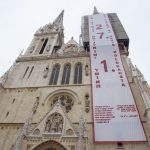ZAGREB, April 21, 2020 – The 75th anniversary of a prisoner breakout from the Jasenovac concentration camp will be marked on Wednesday with senior state officials and representatives of ethnic minorities and antifascists attending a ceremony at the Jasenovac memorial centre.
For the first time after 2014, an official commemoration of the event will be attended by the President of the Republic, the Speaker of Parliament and the Prime Minister, as well as by representatives of the Serb and Roma minorities, the Jewish community and the Alliance of Antifascist Fighters of Croatia (SABA).
Among those to pay respects to the victims of the Ustasha-run camp will be President Zoran Milanović, Parliament Speaker Gordan Jandroković, Prime Minister Andrej Plenković, Jewish community leader Ognjen Kraus, Serb National Council president Milorad Pupovac, MP for the Roma minority Veljko Kajtazi and SABA president Franjo Habulin.
In the past five years, former President Kolinda Grabar-Kitarović sent her representative to the commemoration, while she herself paid respects to the victims alone, mainly several days before the state commemoration.
Since 2015, the ethnic minorities and antifascists have refused to attend state commemorations arguing that Croatia is trying to rewrite the history of the Second World War, and have organised separate commemorations instead.
The Jasenovac concentration camp existed 1,337 days during the Second World War, and the Jasenovac memorial centre has identified and gathered information on 83,145 victims (39,570 men, 23,474 women and 20,101 children aged up to 14 years), who were killed because of their religious, ethnic or ideological affiliation.
According to the Jasenovac memorial centre, after allied bombings of the camp in March and April 1945, in which many of the camp facilities were destroyed, the camp’s commander Vjekoslav Maks Luburić ordered that all the prisoners be killed and the camp be burned down to cover up the crimes.
The last group of about 700 women were executed on the evening of 21 April 1945, when an order was given for the remaining 1,073 men to be relocated to a women’s building in the eastern part of the camp.
Sensing what was going to happen to them, about 600 men led by Ante Bakotić decided to try to break out of the camp on the rainy Sunday morning of 22 April 1945. Only 92 inmates survived. A few hours afterwards, 167 prisoners working in a tannery mounted an escape attempt, with only 11 of them managing to escape.
Since this year’s commemoration is being held amid the coronavirus pandemic, strict social distancing measures will be observed. The state leadership will lay a wreath at the Stone Flower monument, while other delegations will each lay a flower, and there will be no other activities.
More news about Jasenovac can be found in the Politics section.








